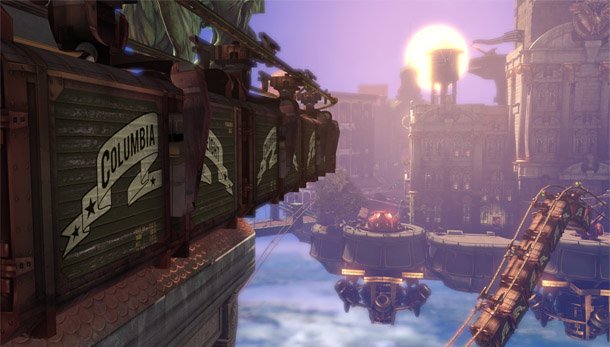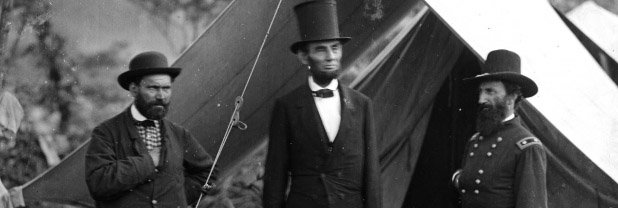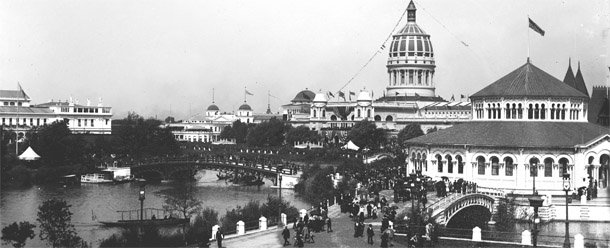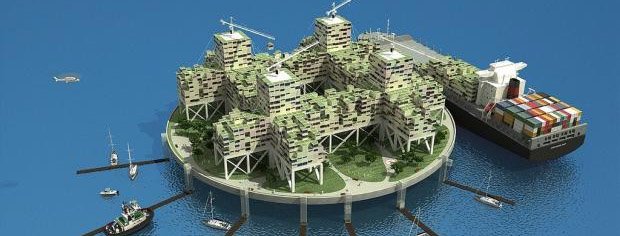Reality Check: Bioshock Infinite

Reality Check is an occasional column dedicated to sandblasting the fictive and fabulary flab from games to reveal the sturdy bones of real-world TRUFAX below.
Booker Dewitt, a former member of the Pinkerton Detective Agency. Songbird, a flying mechanical menace. Columbia, a magnificent floating city in the clouds, first unveiled at the 1893 World's Fair. These are just a few of the elements we're looking forward to exploring in the upcoming Bioshock Infinite , but here at PC Gamer, we're curious: if we strip away the fantastical fanfare, will we uncover some firm facts? For this Reality Check, we fed what we know about Bioshock Infinite into our patented Truth Grinder™ to see what came out the other side.
The Pinkerton National Detective Agency

According to an interview with Ken Levine, Booker Dewitt, the protagonist of Bioshock Infinite, is a former member of the Pinkerton National Detective Agency. The agency is entirely real: it was founded in 1850 by Allan Pinkerton, a guy who sounds like he'd make a great video game protagonist himself.
The son of a Scottish policeman, Allan Pinkerton emigrated to the United States and lived near Chicago in the mid-1800's, working as a barrel-maker and using his cabin as a station for the Underground Railroad. One day while out looking for lumber, he stumbled upon a gang making counterfeit currency. Rather than simply reporting the gang's activities, he personally assisted local law enforcement in tracking down and arresting the counterfeiters, doing such an effective job he was offered a spot in the police department. He accepted, and soon became Chicago's first police detective. This apparently didn't provide him with enough crime to fight, however, so Pinkerton decided to found his own private detective agency, the nation's first.
Pinkerton's agency bore the legend "We Never Sleep" under the image of an unblinking eye, leading to the term "private eye" to describe a detective. The agency quickly established a stellar reputation for busting crooks, and Pinkerton himself even performed personal security for Abraham Lincoln, foiling an ( alleged ) assassination attempt as he passed through Baltimore en route to his inauguration. Pinkerton also pioneered the mugshot, taking photographs of crooks for use on wanted posters and sharing the pictures with the police and other agencies, giving birth to the country's first national criminal database.

Soon, the agency was operating not just in big cities but in the Wild West, where they took on such outlaws as Jesse James, the Daltons, and Butch Cassidy's gang. After Pinkerton's death in 1884, businesses began hiring Pinkerton agents to infiltrate and investigate labor unions, and even to provide armed security for strike-breakers. Hundreds of Pinkerton agents were involved in one of the biggest labor disputes in U.S. history, the Homestead Strike, where a riot and firefight broke out at a Pittsburgh steel mill in 1892, resulting in the deaths of both Pinkerton agents and strikers. Booker Dewitt is said to have worked as a union-buster, and left the agency in disgrace. Could the Homestead Strike be the reason why?
Songbird

In Bioshock Infinite, Songbird is a large, flying, menacing... something or other. Honestly, we're not entirely sure of Songbird's origin or makeup yet, but it's been described as mechanical in nature, sporting massive clockwork wings and glowing eyes. While we wait for the chance to take on this giant robo-bird when the game is released next week, are there any real flying robotic birds we can practice on in the meantime?
Keep up to date with the most important stories and the best deals, as picked by the PC Gamer team.
As it turns out, some progress is actually being made in the efforts to fill our skies with creepy mechanical birds flapping artificial wings (and probably pooping batteries on our cars). A German company called Festo has developed a "SmartBird" that can fly and land autonomously. Watch it fly over a delighted audience at this TED talk (the flight starts around 2:00 minutes in).
Of course, the bird isn't large enough to carry Elizabeth away and probably wouldn't survive a single shotgun blast, but the glowing eyes are a nice menacing touch. The same company has also developed swimming robotic penguins and a flying jellyfish . For some reason. We should probably keep an eye on these guys.
1893 World's Fair

According to Bioshock Infinite's promotional videos , the floating city of Columbia was unveiled at the 1893 World's Fair, also known as The World's Columbian Exposition. Obviously, there was no floating city at the real fair, but there were plenty of other modern marvels on display. Some 200 buildings were erected, over forty countries participated, and nearly 30 million visitors attended to gawk at attractions such as George Ferris's original Ferris Wheel, Nicola Tesla's gas-discharge lamp, and Eadweard Muybridge's zoopraxiscope, which showed moving pictures of animals in the first ever commercial movie theater.
Visitors also got to their first exposure to a number of now-familiar tastes, such as Quaker Oats, Pabst Blue Ribbon, Juicy Fruit Gum, and the popcorn and peanut snack that would come to be known as Cracker Jack, then later come to be known as The Snack With The Prize Inside, and then more recently known as The Snack That Used To Have A Prize Inside But Now It's Just Some Stupid Folded Paper Thing.
Another first for the fair: a man named H. H. Holmes, America's first documented serial killer, murdered more than twenty people in his "Murder Castle", a hotel he bought just blocks from the exposition and customized specifically to slaughter his victims in a manner I won't go into here. A book by Erik Larson, called Devil In The White City , details both the fair and Holmes' gruesome activities, and has been cited by Ken Levine as a major inspiration for the setting of Bioshock Infinite.
A Floating City

Bioshock Infinite has the airborne city of Columbia, but how about us poor chumps stuck in the real world? When will we get a floating city in the sky? The answer, of course, is never, unless you change "in the sky" to "on the ocean", at which point "never" becomes "maybe someday?" The libertarian-founded Seasteading Institute is busy trying to facilitate the construction of mobile floating cities. Bobbing around in international waters, these floating cities plan to attract residents and workers who want to try out new "startup" governments and eventually gain sovereignty.
The question then becomes, would you really want to live on a floating city? In 2011, the Seasteading Institute's FAQ (since changed), contained this tidbit:
"A libertarian seastead should easily be able to have no zoning laws or building codes, low taxes, no import/export tariffs, few restrictions on weapons, local consumption of drugs, no minimum wage..."
Sounds... exciting, to say the least, but if you consider a floating city constructed without building codes by underpaid workers high on drugs and armed to the teeth, it's not hard to imagine it quickly sinking and ending up on the bottom of the sea, thus resembling Andrew Ryan's sunken city of Rapture more than Zachary Comstock's flying city of Columbia.

Chris started playing PC games in the 1980s, started writing about them in the early 2000s, and (finally) started getting paid to write about them in the late 2000s. Following a few years as a regular freelancer, PC Gamer hired him in 2014, probably so he'd stop emailing them asking for more work. Chris has a love-hate relationship with survival games and an unhealthy fascination with the inner lives of NPCs. He's also a fan of offbeat simulation games, mods, and ignoring storylines in RPGs so he can make up his own.

